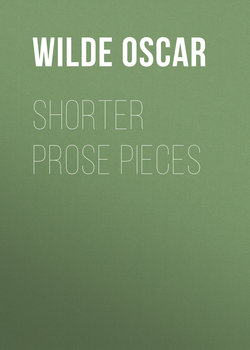Читать книгу Shorter Prose Pieces - Оскар Уайльд, Wilde Oscar, F. H. Cornish - Страница 2
MRS. LANGTRY AS HESTER GRAZEBROOK
ОглавлениеIt is only in the best Greek gems, on the silver coins of Syracuse, or among the marble figures of the Parthenon frieze, that one can find the ideal representation of the marvellous beauty of that face which laughed through the leaves last night as Hester Grazebrook.
Pure Greek it is, with the grave low forehead, the exquisitely arched brow; the noble chiselling of the mouth, shaped as if it were the mouthpiece of an instrument of music; the supreme and splendid curve of the cheek; the augustly pillared throat which bears it all: it is Greek, because the lines which compose it are so definite and so strong, and yet so exquisitely harmonized that the effect is one of simple loveliness purely: Greek, because its essence and its quality, as is the quality of music and of architecture, is that of beauty based on absolutely mathematical laws.
But while art remains dumb and immobile in its passionless serenity, with the beauty of this face it is different: the grey eyes lighten into blue or deepen into violet as fancy succeeds fancy; the lips become flower-like in laughter or, tremulous as a bird's wing, mould themselves at last into the strong and bitter moulds of pain or scorn. And then motion comes, and the statue wakes into life. But the life is not the ordinary life of common days; it is life with a new value given to it, the value of art: and the charm to me of Hester Grazebrook's acting in the first scene of the play last night was that mingling of classic grace with absolute reality which is the secret of all beautiful art, of the plastic work of the Greeks and of the pictures of Jean Francois Millet equally.
I do not think that the sovereignty and empire of women's beauty has at all passed away, though we may no longer go to war for them as the Greeks did for the daughter of Leda. The greatest empire still remains for them – the empire of art. And, indeed, this wonderful face, seen last night for the first time in America, has filled and permeated with the pervading image of its type the whole of our modern art in England. Last century it was the romantic type which dominated in art, the type loved by Reynolds and Gainsborough, of wonderful contrasts of colour, of exquisite and varying charm of expression, but without that definite plastic feeling which divides classic from romantic work. This type degenerated into mere facile prettiness in the hands of lesser masters, and, in protest against it, was created by the hands of the Pre-Raphaelites a new type, with its rare combination of Greek form with Florentine mysticism. But this mysticism becomes over- strained and a burden, rather than an aid to expression, and a desire for the pure Hellenic joy and serenity came in its place; and in all our modern work, in the paintings of such men as Albert Moore and Leighton and Whistler, we can trace the influence of this single face giving fresh life and inspiration in the form of a new artistic ideal.
